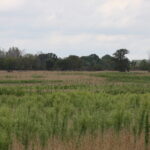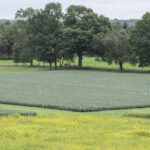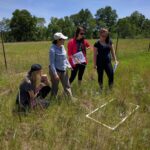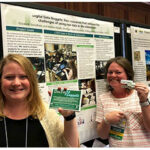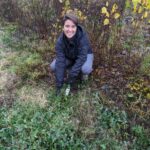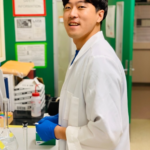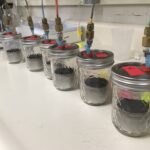The KBS LTER is featured in MSU Today's "My Spartan Summer". Original story, by Beth Brauer, can be found here. For more than 30 years, W.K. Kellogg Biological Station, located between Kalamazoo and Battle Creek, has been part of the national Long-Term Ecological Research network, where MSU researchers have studied the effects of land use intensity in agricultural landscapes on yield, soil health, food webs and more. Led by MSU professor and principal investigator Nick Haddad, the MSU Kellogg Biological Research Station’s Long-Term Ecological Research team has
Are zebra mussels eating or helping toxic algae?
Long-term studies from the Kellogg Biological Station LTER reveal a surprising relationship. The original story, written by Emilie Lorditch, can be found on MSU Today. While invasive zebra mussels consume small plant-like organisms called phytoplankton, Michigan State University researchers discovered during a long-term study that zebra mussels can actually increase Microcystis, a type of phytoplankton known as “blue-green algae” or cyanobacteria, that forms harmful floating blooms. “Microcystis literally means small cell, but numerous cells cluster together in colonies that can
Insects, big data and a passion for open science launch a rewarding career
Christie Bahlai shares how her entomology research and connections made as an MSU postdoc have contributed to work honored with a National Science Foundation early-career award. Postdoctoral researchers are critical contributors to Michigan State University’s (MSU) research, bringing experience and often fresh insight. Christie Bahlai, an assistant professor at Kent State University, was recently selected for a National Science Foundation (NSF) early-career award. Bahlai, a computational ecologist, earned degrees at the University of Guelph before joining University Distinguished
Herbicide resistant weeds threaten conservation agriculture
East Lansing, MI – Soybean farmers are turning away from conservation agriculture practices that protect soil and environmental health to manage herbicide resistant weeds, say researchers in Michigan State University’s (MSU) Department of Agricultural, Food, and Resource Economics (AFRE). In a new study published in the American Journal of Agricultural Economics, Braeden Van Deynze (now a postdoctoral research associate at the University of Washington), Scott Swinton (MSU), and David Hennessy (MSU), examined the herbicide and tillage records of thousands of soybean farmers across the United
Designing agricultural landscapes to provide more than crops
Agriculture is the defining feature of many rural North American landscapes. Over time, a focus on productivity and large-scale cultivation of commodity crops has resulted in agricultural landscapes dominated by large, homogenous fields, such as the corn and soy that blanket the Midwest. But agricultural landscapes provide more than just the crops grown on them. They also offer animal and plant habitat, clean our water and air, and capture carbon in the soil—a host of services often termed ecosystem services. Many key co-benefits are thanks to insects and other arthropods: they pollinate
Novel windows through time open fresh views of long-term research
Just over 40 years ago, the National Science Foundation (NSF) posited a visionary idea: the establishment of a national network of Long Term Ecological Research (LTER) sites. Today, these 28 sites carry an unprecedented database of decades-long ecological observations and experiments. Michigan State University’s LTER site, located at the W.K. Kellogg Biological Station (KBS) near Battle Creek, Mich., was founded in 1988 to employ and understand the ecology of Midwest cropping systems and agricultural landscapes. Researchers study interactions among plants, microbes,
Data Nuggets researchers lead collaborative study examining representation in STEM curriculum
When you were a child, what was your image of a scientist? Could you imagine yourself in those shoes? A new, National Science Foundation-funded study led by Michigan State University researchers and others aims to better understand how science instruction that contains diverse scientist role models affects student attitudes about science, technology, engineering and mathematics—STEM—courses and careers. Data Nuggets, a project that has created free STEM classroom activities since 2011, is integral to the new study. Data Nuggets was founded by postdoctoral
Between friends and foes – when is it best for plants to avoid vs. interact with soil symbionts? Reflections from an LTER fellow
Isabela Lima Borges is a PhD student in the Department of Integrative Biology at Michigan State University and a member of Sarah Fitzpatrick's lab. All organisms on Earth require others to live, and few, if any, have gone untouched by anthropogenic change in the past century. As an ecologist, I am fascinated by how plants interact with other species, and how those interactions are affected by human interventions. Given plants’ fundamental role as the basis of terrestrial food webs, these interactions are critical for most of the biological processes that humans rely upon.
A new perspective – using bioenergy crops to alleviate global warming: Reflections from an LTER fellow
Jinho Lee is a PhD student in the Plant, Soil and Microbial Sciences Department at Michigan State University. He works in the Kravchenko lab with interests in carbon dynamics of soil. Today we are facing one of the biggest environmental challenges that our species has never faced, and one that is caused by our own actions. Since the Industrial Revolution, the worldwide carbon dioxide (CO2) emissions have increased due to use of C-based fossil fuels. This has resulted in global warming. To alleviate global warming and reduce the dependence on fossil fuels, several alternative
Understanding the role of microbial diversity in soil ecosystem functioning: Reflections from a LTER Fellow
Grant Falvo is a PhD student in the Plant, Soil and Microbial Sciences Department at Michigan State University. He works in the Robertson lab within the disciplines of soil microbial ecology and biogeochemistry and is interested in global change phenomena broadly. There are more microorganisms in a typical handful of soil than there are people on this planet. Every year these microbes emit >5 times as much CO2 as all the fossil fuel emissions emitted by humans. Yet recent research is beginning to uncover the dominant role these microbes play in stabilizing a similarly large
- « Previous Page
- 1
- 2
- 3
- 4
- 5
- …
- 11
- Next Page »



